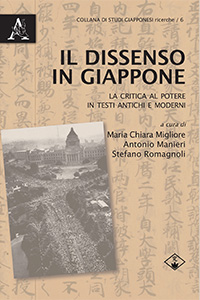Estratto da
IL DISSENSO IN GIAPPONE
La critica al potere in testi antichi e moderni
Dissenso politico ed etica del romitaggio: il ‘Tokyū no’ fu di Kaneakira shinnō (914-987)
IL DISSENSO IN GIAPPONE
La critica al potere in testi antichi e moderni
Dissenso politico ed etica del romitaggio: il ‘Tokyū no’ fu di Kaneakira shinnō (914-987)

Leading figure of ‘literatus’, poet and administrator, Kaneakira was a victim of the rivalry between the two Fujiwara brothers Kanemichi and Kaneie: removed by his charge of ‘sadaijin’, Kaneakira retired to his house at the foot of the Mount of the Turtle, and left a vigorous accusation in the form of a ‘fu’ (rhapsody), denouncing the degeneration of his time and the dissolution of the ‘ritsuryō’ state. Not only in literature but also in the real life, Kaneakira embodies the model of the virtuous man celebrated in Chinese tradition, where reclusion was a pattern of disengagement from political corruption very often expressed through Taoist literary rhetoric. Kaneakira appeals to said Chinese Taoist tradition of reclusion, trying – in vain – to re-create a world of Confucian virtue in which the political relationships between sovereign and subjects are clearly defined and abuses are not tolerated.
| pagine: | 53-73 |
| DOI: | 10.4399/97888548920023 |
| data pubblicazione: | Marzo 2016 |
| editore: | Aracne |








